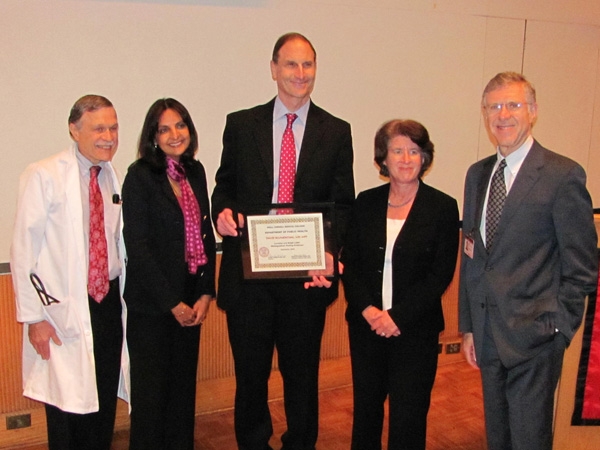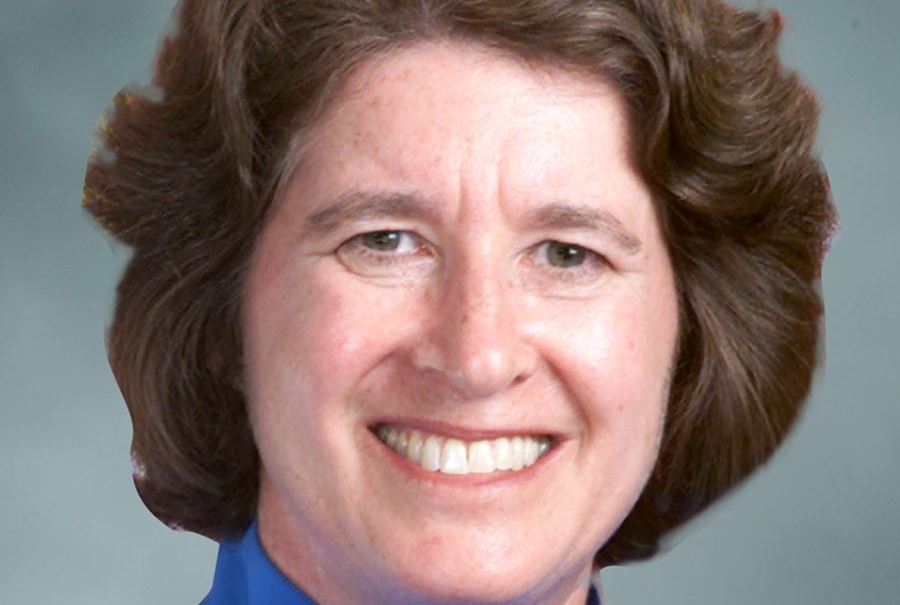
Dr. David Blumenthal, the 2010 Ralph and Lorraine Lubin Distinguished Visiting Professor.
In the early 2000s, as a primary care physician at Massachusetts General Hospital, Dr. David Blumenthal was happy and satisfied in his paper universe. Prescriptions, orders for tests, notes from an examination, all written down and stuffed in a Manila folder that would subsequently be stuffed in a file drawer. It was a comfortable process.
Then, in 2002, Dr. Blumenthal saw his first electronic health record.
"I really didn't want anything to do with it," Dr. Blumenthal said. "But I saw how the residents and medical students were using them with ease, how much faster things moved, and I realized that if I wanted to keep up, this was the kind of thing I had to know. And in doing so I became convinced that this was going to change medical care."
Now Dr. Blumenthal has to convince everyone else. As President Obama's National Coordinator for Health Information Technology, Dr. Blumenthal is the face of the nation's push for an integrated system of health information technology, and that system's place in the larger call for medical care reform. His office is making as much as $27 billion in funding available to hospitals and physicians that adopt electronic health systems.
On Wednesday, Sept. 15, Dr. Blumenthal discussed health information technology at Weill Cornell Medical College's David Rogers Health Policy Colloquium. His talk was the highlight of his day as the 2010 Ralph and Lorraine Lubin Distinguished Visiting Professor. The Professorship, which was endowed 10 years ago in the Department of Public Health by Dr. Madelon Lubin Finkel, professor of clinical public health and director of the Office of Global Health Education, in memory of her parents, supports an annual visit by a highly regarded expert in epidemiology or health care policy.
In addition to presenting at the Rogers Colloquium, Dr. Blumenthal met with Dr. Antonio M. Gotto Jr., dean of the Medical College; Dr. Herbert Pardes, president and CEO of NewYork-Presbyterian Hospital; Dr. David Hajjar, dean of the Graduate School of Medical Sciences; and Stephen Cohen, executive vice provost of the Medical College. He also met with faculty of the Department of Public Health and with Weill Cornell Medical College students enrolled in the Public Health Clerkship.
Dr. Blumenthal was introduced by Dr. Rainu Kaushal, chief of the Division of Quality and Medical Informatics in the Departments of Pediatrics and Public Health and director of Pediatric Quality and Patient Safety for the NewYork-Presbyterian Komansky Center for Children's Health. Dr. Kaushal, who established and directs the Health Information Technology Evaluation Collaborative (HITEC) to evaluate health information technology in New York state, collaborated with Dr. Blumenthal when both physicians were based at Harvard Medical School.
"I think of health care information technology as the circulatory system of medicine, and information is the lifeblood," Dr. Blumenthal said. "The administration of care is only as good as the information those administrators have. And right now, the way we store information hasn't changed much since Hippocrates. We are working with a 2,400-year-old circulatory system."

Dr. David Blumenthal (center) with Public Health faculty including (from left) Drs. Oliver Fein, Rainu Kaushal, Madelon Finkel and Alvin I. Mushlin.
Rerouting that lifeblood so it gets to where it needs to be faster and easier means designing a new circulatory system, and that means three things: electronic health records, health information exchange and clinical-decision support.
The electronic records make the collection, recording and storage of information uniform and easier for the physician - primary care or specialist - as well as the patient to access. Health information exchange ensures that the information travels where the patient does, and that from doctor to doctor and hospital to hospital, the latest orders, prescriptions and notes are always available. Now that the information is available, doctors will be able to engage in clinical-decision support, a system that draws upon algorithms, professional guidelines and polices to dictate evidence-based practices.
On their own, none of these tools are very effective, but integrated together, they can improve every facet of health care, from scheduling patients and ordering tests, to diagnosis, treatment options and discharge.
And while the technology has arrived, adoption has been slow.
Currently only 13 percent of U.S. hospitals have what could be defined as a basic system for electronic health records, Dr. Blumenthal said, and the country as a whole lags far behind Europe, New Zealand and Australia.
"The problem is human-ware, not software," Dr. Blumenthal said. "Physicians, hospitals and patients need to trust that information will get where it needs to be safely."
Part of Dr. Blumenthal's job is to get American hospitals and patients to sign on to the system. To do so, the federal government has said it will direct Medicare and Medicaid funding to hospitals and physicians that adopt electronic health systems for patient and family support; for care coordination; and to monitor quality safety and efficiency.
"Health information technology provides support for the delivery of care, treatment innovation and even payment reform," Dr. Blumenthal said. "This is what will allow health care reform to succeed long term."

